A New Refugee Crisis Stirs Uncomfortable Issues for Europe
The New York Times (archive.ph)
By Erika Solomon and Monika Pronczuk
2022-11-03 16:22:51GMT

Basharmal Mohammadi, second from right, lives with other Afghan teenagers a mile from Belgium’s royal palace and under concrete stairs.Credit...Dmitry Kostyukov for The New York Times
In Brussels, asylum seekers are forced to shelter in cardboard boxes on the street. Across southern Germany, small-town mayors are opening gyms and auditoriums to house ever more refugees. And in the Netherlands, where a 3-month-old baby died this year, the government is being sued for inhumane camp conditions.
With Russia waging war on its doorstep, Europe has taken in 4.4 million Ukrainians this year, in addition to more than 365,000 first-time asylum applicants, many fleeing threats in Syria and Afghanistan.
That is more even than in 2015, which stood out as the landmark period of migration in contemporary European history, when 1.2 million refugees fleeing wars in the Middle East arrived, the bulk of them in Germany. The country’s former chancellor, Angela Merkel, encouraged their welcome with her now-famous line: “We can do it.”
But how Europe will do it again this time is raising nettlesome questions about the distribution of refugees — and their uneven treatment — while heightening concerns over the anticipated arrival of still more Ukrainians as temperatures drop and Russia intensifies its strikes on civilian infrastructure.
“This is going to be a tough winter in Europe, which is facing the biggest forced displacement since World War II,” said Hanne Beirens, the head of the Migration Policy Institute Europe, a Brussels-based research institution. “The conflict in Ukraine is being protracted, and the Ukrainians are going to stay longer.”
As it builds and lingers, Europe’s humanitarian crisis holds the increasing risk of political fallout as a host of challenges pile up.
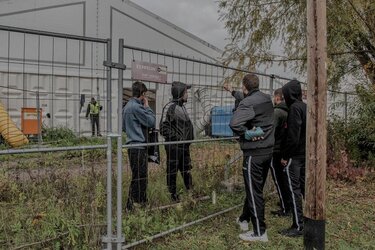
Syrian refugees at a camp in the north of Leipzig, Germany.Credit...Laetitia Vancon for The New York Times

Since mid-September, the district of Konstanz in Germany has turned six sport halls into refugee camps. This one houses 50 Ukrainians.Credit...Laetitia Vancon for The New York Times
Russia’s war in Ukraine presents a security threat of its own. On top of that, as Russia halts gas flows, and E.U. nations impose sanctions on Moscow, an energy crisis has sent inflation soaring, sowing discontent over the cost of living, as well as the war. Economic discontent and wariness of migration have already spurred a fresh surge in far-right and populist forces.
“We are lurching from one crisis to the next,” said Zeno Danner, the district administrator of Konstanz, on the shores of Lake Constance in Germany. “Corona isn’t over. We have an energy crisis. Our population is consumed by economic troubles.”
In an area better known for summer holidays, he is now in the position of converting sports halls into refugee housing centers, sparking the ire of his constituents.
For all of Europe, it is an environment ripe for scapegoating, where the burdens of the crisis are not equally shared, neither among nations nor refugees themselves.
The current crisis is one created by war in Europe, analysts say — not by asylum seekers from conflict-stricken countries like Afghanistan and Syria taking smugglers’ route on foot toward Europe. And yet they are the ones feeling the brunt of it.
Because Europe has granted Ukrainians automatic residency and visas, Ukrainians are at the front of the line for housing and refugee services. In some places, conditions are at a breaking point, with asylum seekers crammed into overcrowded reception centers.

Asylum seekers lining up at the refugee reception center in Brussels in October.Credit...Dmitry Kostyukov for The New York Times

Refugees sleeping on a bridge in Brussels in October.Credit...Dmitry Kostyukov for The New York Times
A Dutch court recently ordered the government to improve asylum centers, after hundreds of people were forced to sleep outside this summer with little or no access to water or health care. The circumstances under which the 3-month-old girl died are still being investigated.
On Wednesday, the European Court of Human Rights ordered the Belgian government to provide housing for a Guinean who had been living on the street since July, when he applied for asylum.
Brussels, the Belgian capital and home to the headquarters of the European Union, has already used all 31,000 of its housing spaces, leaving 3,500 asylum seekers homeless.
They include Basharmal Mohammadi, who said he had fled Afghanistan after the Taliban killed his father and brother. Just a mile from Belgium’s royal palace, he lives with seven other Afghan teenagers under concrete stairs where they share cardboard boxes and a molding mattress.
“I never thought I would be living on a street like that in Europe,” Mr. Mohammadi said. “Our country has been at war for 45 years, and I thought I could get a better life here.”
The disparities have left activists like David Schmidtke, spokesman of the Saxony Refugee Council in Dresden, denouncing what they call a two-tier system that disadvantages and discriminates against asylum seekers from outside Ukraine.

Anastasia Orchenita, 33, who is from Mariupol, Ukraine, and her two children at the refugee camp of Stockach, Germany. Officials say they are overwhelmed by the arrival Ukrainians and some 80,000 other asylum seekers. Credit...Laetitia Vancon for The New York Times

Stockach is in the district of Konstanz. “We are lurching from one crisis to the next,” said the district administrator. Credit...Laetitia Vancon for The New York Times
“This is institutional racism,” he said. “There are two classes of refugees.”
In Germany and across the rest of the European Union, officials say the sudden scale of the Ukrainian arrivals has left the bloc with little choice but to offer automatic recognition and, therefore, direct access to services for which other asylum seekers often wait months and years.
But refugee rights advocates and even some civil servants say there was ample time since 2015 — when Europe declined to offer automatic recognition — to improve the asylum system.
“This is not a sudden crisis,” said Lies Gilis, a spokeswoman for Fedasil, the Belgian federal government agency responsible for the reception of asylum seekers. “We have been warning the government about this for many, many months.”
Germany, which prided itself on taking in nearly one million Syrian refugees, is feeling overwhelmed by the arrival of a similar number of Ukrainians and some 80,000 other asylum seekers. Some towns warn that they are seeing numbers they never witnessed, even in 2015.
Public housing is squeezed. Hotels and hostels have been rented out and filled up. Now, trade fair halls are being refitted and large container camps expanded.
Some German leaders worry that the more the refugee crisis, along with economic woes, is felt in daily life, the more it will feed anti-migration tensions long exploited by the far right. Even the Ukrainians, once welcomed, now stir some resentment.
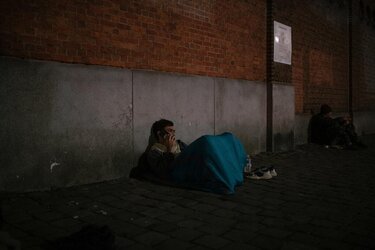
Asylum seekers in Brussels. The Belgian capital has used up all 31,000 of its housing spaces, leaving 3,500 asylum seekers homeless.Credit...Dmitry Kostyukov for The New York Times
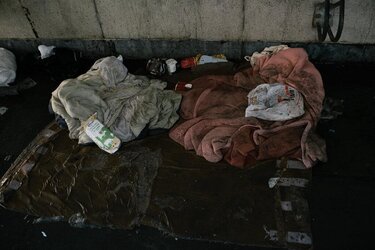
The belongings of asylum seekers who spent a night waiting to take their place in line at a refugee reception center in Brussels in October.Credit...Dmitry Kostyukov for The New York Times
This week, an old hotel being prepared for asylum seekers near Dresden was partly torched. In October, a hostel housing Ukrainians in Germany was set ablaze, too. No one was hurt in either fire.
While Ukrainians are far and away the majority of new refugees, some politicians have blamed the strains on the system on asylum seekers from Syria, Afghanistan and other places outside Europe.
In Austria, some 71,000 people from outside Ukraine have applied for asylum this year, edging close to 2015 levels. Though the numbers of Ukrainians are roughly as much, if not more, it is the others sparking outrage in recent weeks.
When the Austrian authorities in Tyrol began setting up tents in the town of St. Georgen, far-right leaders joined locals to protest.
“We help when it’s necessary. But now it’s enough; now it’s too much,” the mayor, Ferdinand Aigner, told Austria’s Der Standard. “Even a lamb will go wild if you keep beating it.”
Austria has now followed the Czech Republic in closing its border with Slovakia, where many irregular asylum seekers seek to cross.
The mood has pushed some German officials, including Interior Minister Nancy Faeser, to join calls for Europe to better control its borders.
The new crisis has also revived debates over who should host refugees — but with the old roles reversed.
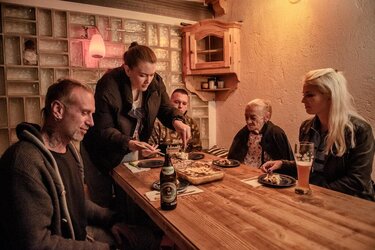
Sasha Kovtutskyi, third from left, and other Ukrainians found shelter with Andi Böhm, left, and Johanna Murr, right, in Munich. Credit...Laetitia Vancon for The New York Times
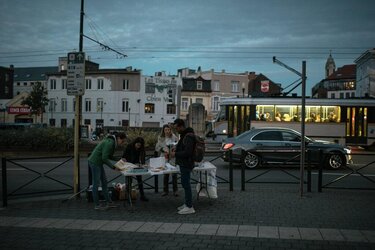
Handing out food to asylum seekers in Brussels in October.Credit...Dmitry Kostyukov for The New York Times
Countries like Italy and Greece, where asylum seekers first reach E.U. shores, have long demanded a fairer sharing of newcomers from their E.U. partners. But Germany and others have resisted such a redistribution system, asking instead that asylum seekers be hosted where they first arrive.
Now it’s Germany, which is second only to Poland in the number of Ukrainians it hosts, and other wealthy northern European countries complaining that they are hosting too many refugees.
“Why is it that all of France has fewer Ukrainians than just the German state of Baden Württemberg?” asked Gerald Knaus, chairman of the European Stability Initiative. “And why is it that France, Italy and Spain together have fewer Ukrainians than the Czech Republic?” he added. Mr. Knaus was an architect of Ms. Merkel’s controversial 2016 deal with Turkey that, for a time, stalled the earlier refugee influx.
Thomas Fabian, the deputy mayor of the East German city of Leipzig, says many places are now struggling because they had resisted maintaining facilities for refugees.
Setting up temporary housing — as many are having to do now — costs far more, he said. He says he believes that leaders in Germany and beyond must accept that, between wars and climate change, migration is a part of Europe.
“The problem isn’t that many people come here,” he said. “The problem is we need a system of distribution.”
Even as conditions worsen for many, there is no sign that the migration will slow.
Many recently arrived asylum seekers interviewed in Germany expected more to come — particularly Syrians who once found refuge in Turkey and now say they are facing increasing hostility there, including death threats and assault.
Ukrainians, too, do not believe tensions or tougher conditions will prevent their loved ones from joining them, especially if the fighting intensifies and Russia continues its bombardment of infrastructure that could leave civilians in the cold.
“Dozens of our friends are already forced to sit at home without electricity for 20 hours at a time,” said Sasha Kovtutskyi, who was hosted along with his wife by a German family in Munich as they searched for eight months to find their own home.
All of this means that for civil servants like Ms. Gilis, of Belgium’s Fedasil, it has become a race to the bottom. “Now you have to choose who is the most vulnerable among the vulnerable,” she said.
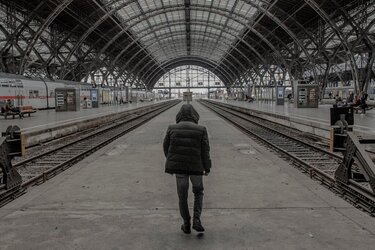
A Syrian refugee who recently arrived in Germany at the central station of Leipzig. He now lives in a camp while waiting for his asylum case to be settled in court.Credit...Laetitia Vancon for The New York Times
Monika Pronczuk is a reporter based in Brussels. She joined The Times in 2020. @MonikaPronczuk
The New York Times (archive.ph)
By Erika Solomon and Monika Pronczuk
2022-11-03 16:22:51GMT

Basharmal Mohammadi, second from right, lives with other Afghan teenagers a mile from Belgium’s royal palace and under concrete stairs.Credit...Dmitry Kostyukov for The New York Times
In Brussels, asylum seekers are forced to shelter in cardboard boxes on the street. Across southern Germany, small-town mayors are opening gyms and auditoriums to house ever more refugees. And in the Netherlands, where a 3-month-old baby died this year, the government is being sued for inhumane camp conditions.
With Russia waging war on its doorstep, Europe has taken in 4.4 million Ukrainians this year, in addition to more than 365,000 first-time asylum applicants, many fleeing threats in Syria and Afghanistan.
That is more even than in 2015, which stood out as the landmark period of migration in contemporary European history, when 1.2 million refugees fleeing wars in the Middle East arrived, the bulk of them in Germany. The country’s former chancellor, Angela Merkel, encouraged their welcome with her now-famous line: “We can do it.”
But how Europe will do it again this time is raising nettlesome questions about the distribution of refugees — and their uneven treatment — while heightening concerns over the anticipated arrival of still more Ukrainians as temperatures drop and Russia intensifies its strikes on civilian infrastructure.
“This is going to be a tough winter in Europe, which is facing the biggest forced displacement since World War II,” said Hanne Beirens, the head of the Migration Policy Institute Europe, a Brussels-based research institution. “The conflict in Ukraine is being protracted, and the Ukrainians are going to stay longer.”
As it builds and lingers, Europe’s humanitarian crisis holds the increasing risk of political fallout as a host of challenges pile up.

Syrian refugees at a camp in the north of Leipzig, Germany.Credit...Laetitia Vancon for The New York Times

Since mid-September, the district of Konstanz in Germany has turned six sport halls into refugee camps. This one houses 50 Ukrainians.Credit...Laetitia Vancon for The New York Times
Russia’s war in Ukraine presents a security threat of its own. On top of that, as Russia halts gas flows, and E.U. nations impose sanctions on Moscow, an energy crisis has sent inflation soaring, sowing discontent over the cost of living, as well as the war. Economic discontent and wariness of migration have already spurred a fresh surge in far-right and populist forces.
“We are lurching from one crisis to the next,” said Zeno Danner, the district administrator of Konstanz, on the shores of Lake Constance in Germany. “Corona isn’t over. We have an energy crisis. Our population is consumed by economic troubles.”
In an area better known for summer holidays, he is now in the position of converting sports halls into refugee housing centers, sparking the ire of his constituents.
For all of Europe, it is an environment ripe for scapegoating, where the burdens of the crisis are not equally shared, neither among nations nor refugees themselves.
The current crisis is one created by war in Europe, analysts say — not by asylum seekers from conflict-stricken countries like Afghanistan and Syria taking smugglers’ route on foot toward Europe. And yet they are the ones feeling the brunt of it.
Because Europe has granted Ukrainians automatic residency and visas, Ukrainians are at the front of the line for housing and refugee services. In some places, conditions are at a breaking point, with asylum seekers crammed into overcrowded reception centers.

Asylum seekers lining up at the refugee reception center in Brussels in October.Credit...Dmitry Kostyukov for The New York Times

Refugees sleeping on a bridge in Brussels in October.Credit...Dmitry Kostyukov for The New York Times
A Dutch court recently ordered the government to improve asylum centers, after hundreds of people were forced to sleep outside this summer with little or no access to water or health care. The circumstances under which the 3-month-old girl died are still being investigated.
On Wednesday, the European Court of Human Rights ordered the Belgian government to provide housing for a Guinean who had been living on the street since July, when he applied for asylum.
Brussels, the Belgian capital and home to the headquarters of the European Union, has already used all 31,000 of its housing spaces, leaving 3,500 asylum seekers homeless.
They include Basharmal Mohammadi, who said he had fled Afghanistan after the Taliban killed his father and brother. Just a mile from Belgium’s royal palace, he lives with seven other Afghan teenagers under concrete stairs where they share cardboard boxes and a molding mattress.
“I never thought I would be living on a street like that in Europe,” Mr. Mohammadi said. “Our country has been at war for 45 years, and I thought I could get a better life here.”
The disparities have left activists like David Schmidtke, spokesman of the Saxony Refugee Council in Dresden, denouncing what they call a two-tier system that disadvantages and discriminates against asylum seekers from outside Ukraine.

Anastasia Orchenita, 33, who is from Mariupol, Ukraine, and her two children at the refugee camp of Stockach, Germany. Officials say they are overwhelmed by the arrival Ukrainians and some 80,000 other asylum seekers. Credit...Laetitia Vancon for The New York Times

Stockach is in the district of Konstanz. “We are lurching from one crisis to the next,” said the district administrator. Credit...Laetitia Vancon for The New York Times
“This is institutional racism,” he said. “There are two classes of refugees.”
In Germany and across the rest of the European Union, officials say the sudden scale of the Ukrainian arrivals has left the bloc with little choice but to offer automatic recognition and, therefore, direct access to services for which other asylum seekers often wait months and years.
But refugee rights advocates and even some civil servants say there was ample time since 2015 — when Europe declined to offer automatic recognition — to improve the asylum system.
“This is not a sudden crisis,” said Lies Gilis, a spokeswoman for Fedasil, the Belgian federal government agency responsible for the reception of asylum seekers. “We have been warning the government about this for many, many months.”
Germany, which prided itself on taking in nearly one million Syrian refugees, is feeling overwhelmed by the arrival of a similar number of Ukrainians and some 80,000 other asylum seekers. Some towns warn that they are seeing numbers they never witnessed, even in 2015.
Public housing is squeezed. Hotels and hostels have been rented out and filled up. Now, trade fair halls are being refitted and large container camps expanded.
Some German leaders worry that the more the refugee crisis, along with economic woes, is felt in daily life, the more it will feed anti-migration tensions long exploited by the far right. Even the Ukrainians, once welcomed, now stir some resentment.

Asylum seekers in Brussels. The Belgian capital has used up all 31,000 of its housing spaces, leaving 3,500 asylum seekers homeless.Credit...Dmitry Kostyukov for The New York Times

The belongings of asylum seekers who spent a night waiting to take their place in line at a refugee reception center in Brussels in October.Credit...Dmitry Kostyukov for The New York Times
This week, an old hotel being prepared for asylum seekers near Dresden was partly torched. In October, a hostel housing Ukrainians in Germany was set ablaze, too. No one was hurt in either fire.
While Ukrainians are far and away the majority of new refugees, some politicians have blamed the strains on the system on asylum seekers from Syria, Afghanistan and other places outside Europe.
In Austria, some 71,000 people from outside Ukraine have applied for asylum this year, edging close to 2015 levels. Though the numbers of Ukrainians are roughly as much, if not more, it is the others sparking outrage in recent weeks.
When the Austrian authorities in Tyrol began setting up tents in the town of St. Georgen, far-right leaders joined locals to protest.
“We help when it’s necessary. But now it’s enough; now it’s too much,” the mayor, Ferdinand Aigner, told Austria’s Der Standard. “Even a lamb will go wild if you keep beating it.”
Austria has now followed the Czech Republic in closing its border with Slovakia, where many irregular asylum seekers seek to cross.
The mood has pushed some German officials, including Interior Minister Nancy Faeser, to join calls for Europe to better control its borders.
The new crisis has also revived debates over who should host refugees — but with the old roles reversed.

Sasha Kovtutskyi, third from left, and other Ukrainians found shelter with Andi Böhm, left, and Johanna Murr, right, in Munich. Credit...Laetitia Vancon for The New York Times

Handing out food to asylum seekers in Brussels in October.Credit...Dmitry Kostyukov for The New York Times
Countries like Italy and Greece, where asylum seekers first reach E.U. shores, have long demanded a fairer sharing of newcomers from their E.U. partners. But Germany and others have resisted such a redistribution system, asking instead that asylum seekers be hosted where they first arrive.
Now it’s Germany, which is second only to Poland in the number of Ukrainians it hosts, and other wealthy northern European countries complaining that they are hosting too many refugees.
“Why is it that all of France has fewer Ukrainians than just the German state of Baden Württemberg?” asked Gerald Knaus, chairman of the European Stability Initiative. “And why is it that France, Italy and Spain together have fewer Ukrainians than the Czech Republic?” he added. Mr. Knaus was an architect of Ms. Merkel’s controversial 2016 deal with Turkey that, for a time, stalled the earlier refugee influx.
Thomas Fabian, the deputy mayor of the East German city of Leipzig, says many places are now struggling because they had resisted maintaining facilities for refugees.
Setting up temporary housing — as many are having to do now — costs far more, he said. He says he believes that leaders in Germany and beyond must accept that, between wars and climate change, migration is a part of Europe.
“The problem isn’t that many people come here,” he said. “The problem is we need a system of distribution.”
Even as conditions worsen for many, there is no sign that the migration will slow.
Many recently arrived asylum seekers interviewed in Germany expected more to come — particularly Syrians who once found refuge in Turkey and now say they are facing increasing hostility there, including death threats and assault.
Ukrainians, too, do not believe tensions or tougher conditions will prevent their loved ones from joining them, especially if the fighting intensifies and Russia continues its bombardment of infrastructure that could leave civilians in the cold.
“Dozens of our friends are already forced to sit at home without electricity for 20 hours at a time,” said Sasha Kovtutskyi, who was hosted along with his wife by a German family in Munich as they searched for eight months to find their own home.
All of this means that for civil servants like Ms. Gilis, of Belgium’s Fedasil, it has become a race to the bottom. “Now you have to choose who is the most vulnerable among the vulnerable,” she said.

A Syrian refugee who recently arrived in Germany at the central station of Leipzig. He now lives in a camp while waiting for his asylum case to be settled in court.Credit...Laetitia Vancon for The New York Times
Monika Pronczuk is a reporter based in Brussels. She joined The Times in 2020. @MonikaPronczuk